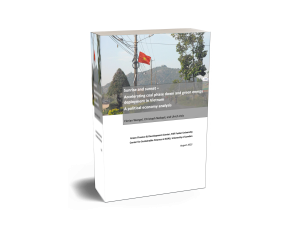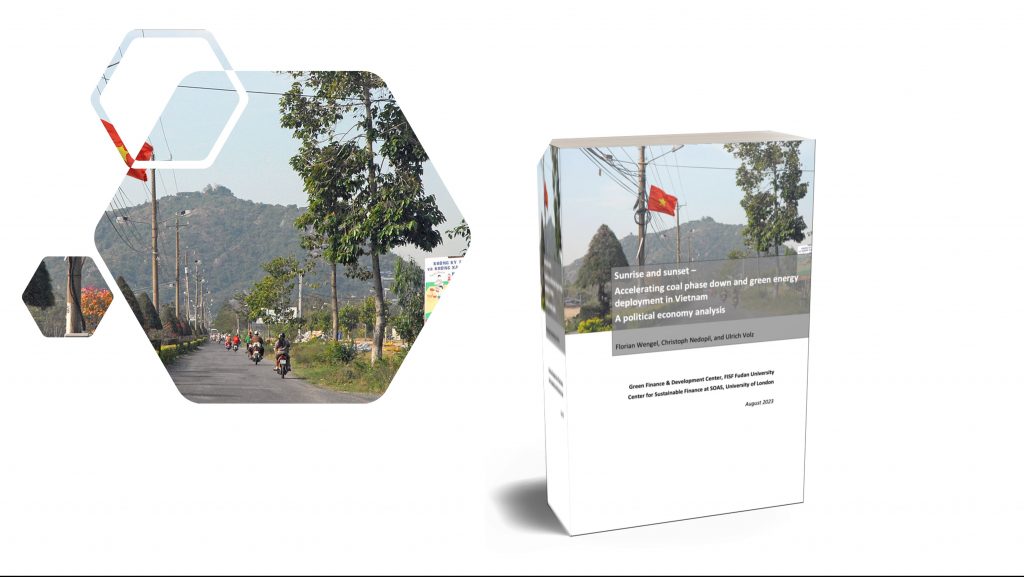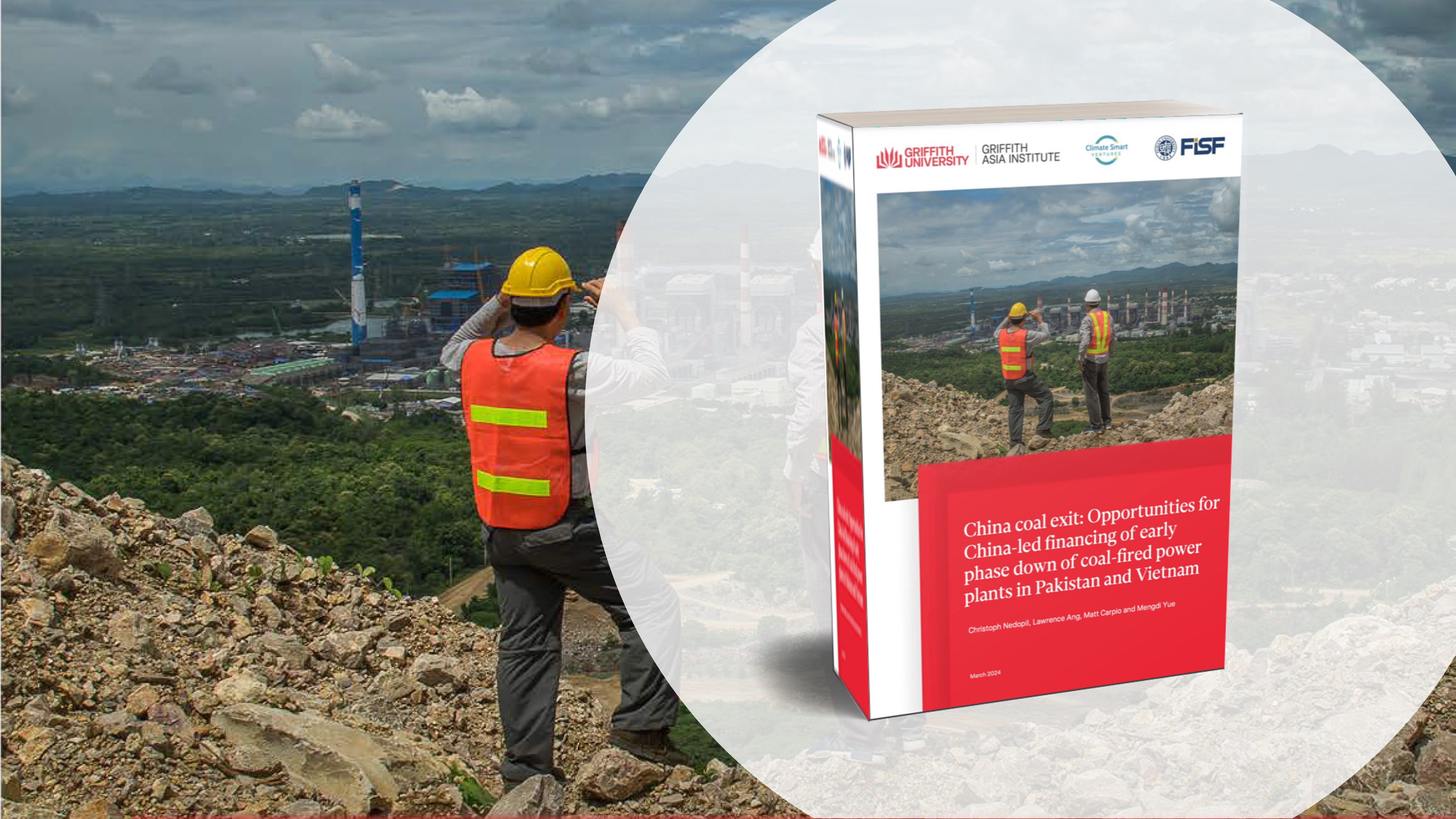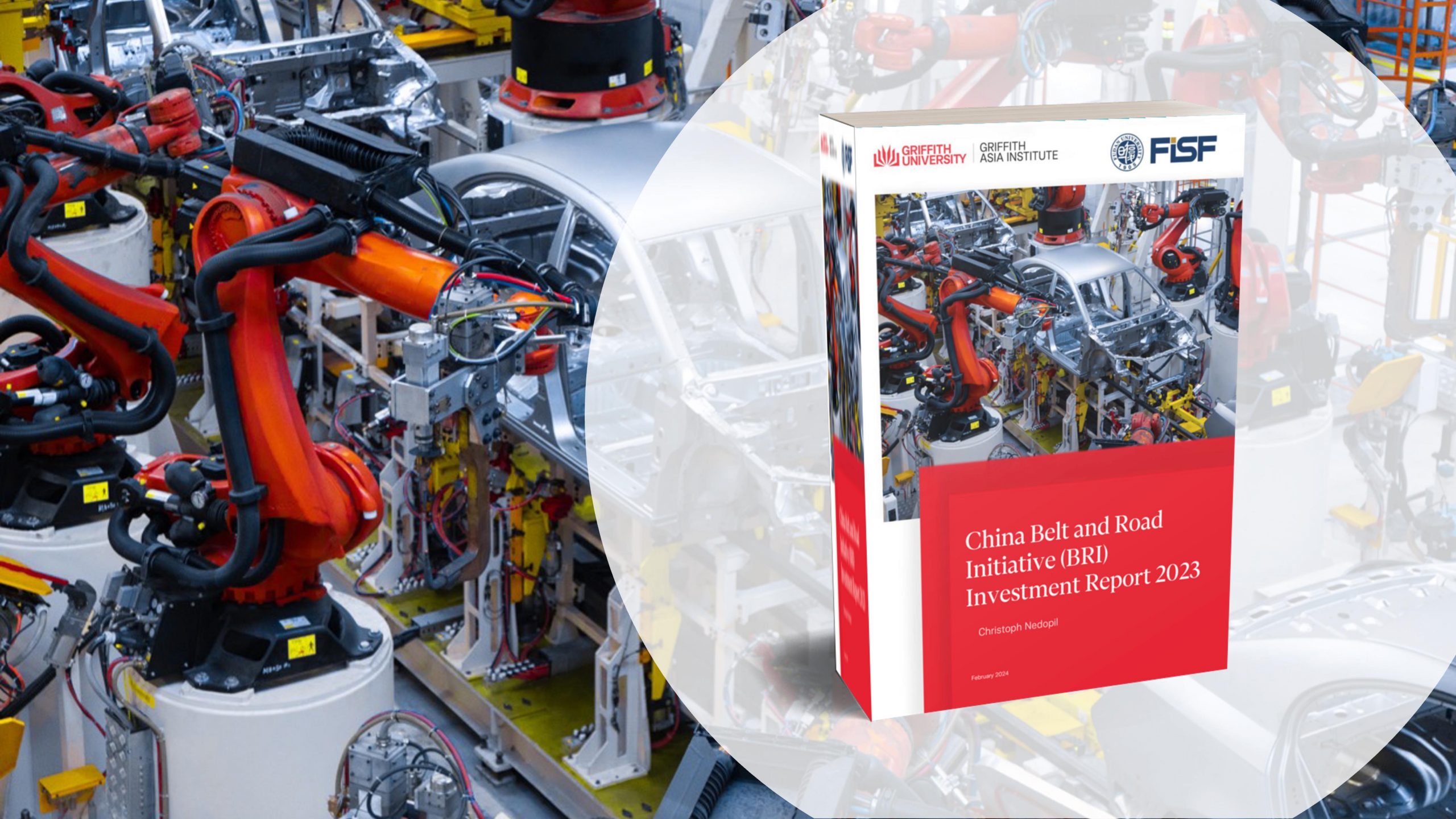In a new report, Florian Wengel (Centre of Sustainable Finance, SOAS University of London), Christoph Nedopil (GFDC), and Uli Volz (also Centre for Sustainable Finance) analyze the opportunities for accelerated coal phase-down and green energy expansion in Vietnam.

Executive Summary
Thanks to the rapid expansion of renewable power sources, Vietnam’s installed power generation capacity has enjoyed vigorous growth after 2019. The addition of previously unused solar and wind power has diversified Vietnam’s power mix that has been historically dominated by hydro and coal power. Since the Vietnamese economy and its power demand will further grow throughout the next decades, the country needs to further scale up power generation, transmission and storage capacity. One option would be to scale up coal-fired power generation but the continued operation and expansion of coal-fired power stations creates a trade-off with the country’s target to mitigate climate change and achieve carbon neutrality by 2050.
Vietnam’s Power Development Plan VIII (PDP8) heralds a new era for the generation of electricity in one of the world’s fastest-growing economies. To meet future growth in electricity demand while transitioning towards a carbon neutral economy, Vietnam endeavours to expand the capacity of renewable energy (RE) sources massively and develop other low carbon energy sources towards 2050. Despite growing concerns regarding the future economic viability of coal-fired power stations and their negative externalities, Vietnam still plans to construct a (yet downsized) pipeline of coal power stations until 2030. Subsequently, between 2030 and 2050 Vietnam aspires to gradually refurbish and phase out the entire fleet of coal-fired power stations, conditional on international support.
Political economy factors have shaped decision making in Vietnam’s energy sector. These factors reveal a nuanced picture of the obstacles and drivers of early coal phase out. Our analysis illustrates how different political economy factors are influencing the energy transition in Vietnam away from fossil fuels.
Barriers to accelerated coal phase-down in Vietnam
The four main barriers to accelerated coal phase out and the energy transition in the context of Vietnam are:
- Fluctuating RE installations require a reconfiguration of Vietnam’s grid infrastructure. Today’s insufficient power storage and transmission infrastructure cannot handle large fluxes of intermittent RE and cannot solve regional imbalances in RE generated electricity. This constrains further expansion of RE and cements coal dependency. An increasing share of RE could destabilize power transmission and interrupt supply without an updated transmission system and smartly located storage capacity.
- Additional RE generation capacity in Vietnam is expected to be mainly financed by private capital. Investing in RE in Vietnam is currently however not attractive for private investors due to high investment risks resulting from a monopolized distribution market, low and regulated retail electricity prices, coal subsidies, regulatory ambiguity and immaturity, and the current lack of incentive mechanisms.
- Expected financial losses provoke resistance to coal phase down. Accelerated decomissioning of coal plants could entail high compensation costs for the Vietnamese state. Investors and operators of existing coal plants advocate against early coal phase out to safeguard cash flows.
- Vietnam’s energy establishment clings to vested interests in the coal sector. Entanglements between regulating and regulated entities and deficient reporting duties by energy state owned enterprises (SOEs) pave the way for individual profits along the coal supply chain. In terms of mentality, the energy establishment continues to see coal power as a guarantee for a reliable electricity supply. Reservations vis-à-vis RE persist and the energy establishment is sceptical that international partners will live up to financial commitments
Drivers for accelerated green energy transition in Vietnam
We identified four main drivers for an accelerated transition to a net-zero energy system:
- Growing risk of coal financing in Vietnam might allow for more green energy financing to meet growing electricity needs: Difficulties in mobilizing investment capital for coal-fired power plants challenges the expansion of coal power in Vietnam and stresses the need to transition to other energy sources. An increasing number of financial institutions (FIs) are refusing to finance coal-fired power plants due to climate related risks attached to coal financing. Chinese FIs are constrained by China’s moratorium on ceasing funding for the construction of new overseas coal power stations.
- The phase-down of coal and the decarbonisation of the energy sector is key to achieve Vietnam’s net-zero carbon commitment by 2050. Vietnam is bound to international climate commitments such as the Paris Agreement and the Global Coal to Clean Power Transition Statement.
- Vietnam aspires to establish a power system independent from global suppliers. Vietnam is reliant on imports from other Asian countries for a significant portion of the demand of thermal power stations. RE sources allow Vietnam to be less susceptible to shifts in international commodity supplies and prices.
- Greening the energy system can attract more international investors with global exports: The accelerated pace and ambition of decarbonizing in the global economy and an increasing demand for low-carbon products incentivizes Vietnam to decarbonize its energy system and economy. Transitioning the economy to net-zero, establishing an effective domestic emissions trading system (ETS), strengthening competitiveness in net-zero aligned sectors such as RE equipment manufacturing or rare earths, and building green industrial clusters provide opportunities for higher foreign direct investment (FDI) in Vietnam and increased exports, particularly when new carbon border adjustment mechanisms provoke tariffs for emission intensive products.
Recommendations for accelerated green energy transition in Vietnam
A detailed understanding of the political economy of Vietnam’s energy transition is crucial to formulate an effective strategy to accelerate and implement the transition to clean energy. Based on our political economy analysis, we formulate a set of proposed actions for an accelerated clean energy transition in Vietnam:
- Clarify legal and policy framework for decommissioning of outdated coal plants
- Reconsider the economic and technological rationale behind the construction of new coal power plants until 2030
- Introduce regulations and policies to minimize investment risks and attract investment into grid infrastructure and renewables
- Introduce region-specific electricity tariffs and steady tariff increase to reach and maintain a level similar to the ASEAN average
- Develop and implement holistic and coordinated energy sector reforms as well as effective oversight and monitoring
- Advance net zero solutions outside the power sector (e.g., transport)
- Provide the committed assistance to Vietnam’s energy transition through funding, expertise, and partnerships

Acknowledgements
We appreciate the support from our partner organizations in bringing their detailed feedback, suggestions and comments. We extend our sincere gratitude to the ten anonymous interviewees for generously sharing expertise, experiences, and perspectives, thereby enriching our understanding of the subject matter. Lastly, our study benefited from helpful discussions at a closed-door online workshop with stakeholders across Asia organized by the Green Finance & Development Center FISF Fudan University, Centre for Sustainable Finance SOAS University of London, Renewables First Pakistan and IEEFA Pakistan on 3 August 2023.
This report was prepared with generous support by the World Resource Institute (WRI). The report does not reflect official positions from the organization.







Comments are closed.